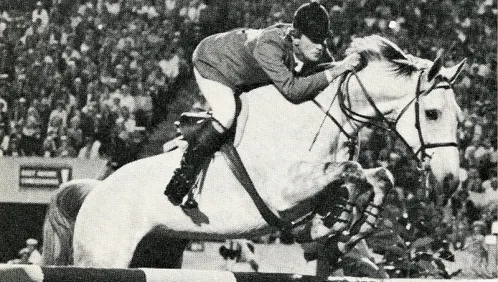Larry Glefke and Ken Garber’s newest hunter star, Commentary, raised questions about industry-wide record keeping at the Upperville Colt and Horse Show (Va.), June 3-9.
The mare, previously named RF Amber Eyes and owned by Karen O’Connor, competed up to the two-star level, most recently finishing fifth at the Jersey Fresh CIC** (N.J.) with Hannah Sue Burnett in early May. Glefke and Garber bought her the next week, and on June 2 she made her hunter debut at Devon (Pa.), finishing second in the USHJA International Hunter Derby with Glefke’s partner at Lane Change Farms, Kelley Farmer, up.
The next week the mare showed at Upperville, winning the second year green hunter, grand green hunter and reserve high performance hunter titles with Farmer. She was also slated to compete in the derby there but was scratched, as she was in the process of being vetted to be re-sold.
When Glefke and Garber changed her name to Commentary, she was also registered anew with the U.S. Equestrian Federation, leaving the mare with two USEF numbers. Commentary’s new registry also listed a different age for the horse and didn’t include her breeding, which had been included in the original listing.
According to Glefke, the double registration and inaccurate information was an accident, and Farmer misheard or misremembered the horse’s age when she registered the mare. Glefke said he was unaware of the discrepancy in registrations and that he closed the sale quickly because the mare was due to head to Europe that same week.
“I didn’t know that the three-day horses are registered,” he said. “The sale happened in a matter of about five hours. I don’t even have her passport yet.”
Farmer contacted the U.S. Equestrian Federation to correct the mistake as soon as she was alerted to the discrepancy, and the Chronicle has confirmed that the horse’s new name and owner have been synched with the horse’s original information.
USEF rule HU101 forbids multiple registration numbers for the same horse, but Ken Ball, Director of Horse Registration and Services, said that unless a horse is registered with identical information, such as pedigree and foal date, there’s no easy way for the USEF to know; owners do not need to provide documentation proving pedigree or foal date when registering with the USEF.
ADVERTISEMENT
“I wish there was an easier way to fix that, but I don’t know that it will happen,” said Ball. “If we go to microchipping, that could help stop some of that from happening.”
Ball said that if a horse goes through a name change process, its record is searchable through all the names it’s had during its career, but that the system doesn’t list all the horse’s aliases he has shown under during his career. The price of changing a name versus registering a horse depends on the type of registration. Lifetime registration, for example, costs $200. Meanwhile, transferring ownership—a process the regulations department has streamlined in recent years—and changing a name each incurs a $60 fee.
Glefke also answered questions about Commentary’s eligibility for the second year green division. He knew the horse had competed one year in the United States, and in Europe before that. He said it’s common industry practice to consider a horse’s first year competing in the United States as their first green year, even if it competed in Europe.
HU103 states that “A Green Hunter is a horse of any age in its first or second year of showing in any classes in which the national specifications require horses to jump 3’6” or higher, regardless of whether or not the fences are actually set at 3’6” or higher at Regular Competitions or Eventing Competitions of the Federation or Equine Canada or any national or international competition.”
According to Lauren Fahey, Director of National Hunter Affiliates of the USEF, horses entered to compete in classes restricted by green status do not normally need any specific paperwork to do so, and the Federation does not have to pre-approve horses to show in classes restricted by status. The Federation does evaluate applications from owners wishing to reinstate their horse’s green status, in which case a records check is completed to determine eligibility.
Fahey said that to the best of her recollection, she has never consulted a horse’s European or international record through the Fédération Equestre Internationale when investigating a horse’s green status eligibility.
“That’s not something that we’ve ever done,” she said. “[But] if the charge was specific to that, if someone said ‘this horse competed at 1.50 meter,’ I’m sure we’d use every method we could to check that.”















